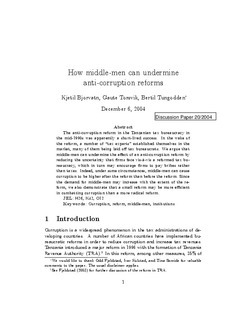| dc.contributor.author | Bjorvatn, Kjetil | |
| dc.contributor.author | Torsvik, Gaute | |
| dc.contributor.author | Tungodden, Bertil | |
| dc.date.accessioned | 2006-08-03T07:34:13Z | |
| dc.date.available | 2006-08-03T07:34:13Z | |
| dc.date.issued | 2004-12 | |
| dc.identifier.issn | 0804-6824 | |
| dc.identifier.uri | http://hdl.handle.net/11250/162772 | |
| dc.description.abstract | The anti-corruption reform in the Tanzanian tax bureaucracy in
the mid-1990s was apparently a short-lived success. In the wake of
the reform, a number of “tax experts” established themselves in the
market, many of them being laid off tax bureaucrats. We argue that
middle-men can undermine the effect of an anti-corruption reform by
reducing the uncertainty that firms face vis-à-vis a reformed tax bureaucracy,
which in turn may encourage firms to pay bribes rather
than taxes. Indeed, under some circumstances, middle-men can cause
corruption to be higher after the reform than before the reform. Since
the demand for middle-men may increase with the extent of the reform,
we also demonstrate that a small reform may be more efficient in combatting corruption than a more radical reform. | en |
| dc.format.extent | 305207 bytes | |
| dc.format.mimetype | application/pdf | |
| dc.language.iso | eng | en |
| dc.publisher | Norwegian School of Economics and Business Administration. Department of Economics | en |
| dc.relation.ispartofseries | Discussion paper | en |
| dc.relation.ispartofseries | 2004:20 | en |
| dc.subject | corruption | en |
| dc.subject | reform | en |
| dc.subject | middle-men | en |
| dc.subject | institutions | en |
| dc.title | How middle-men can undermine anti-corruption reforms | en |
| dc.type | Working paper | en |
